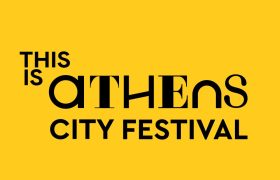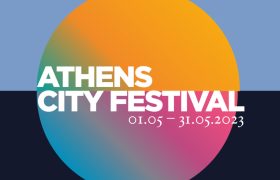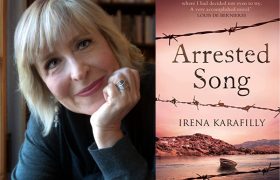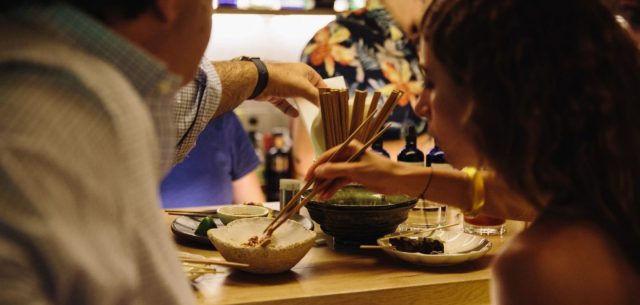Wisdom, Wine, and Wonder: Insider’s Literary Salon in Plaka
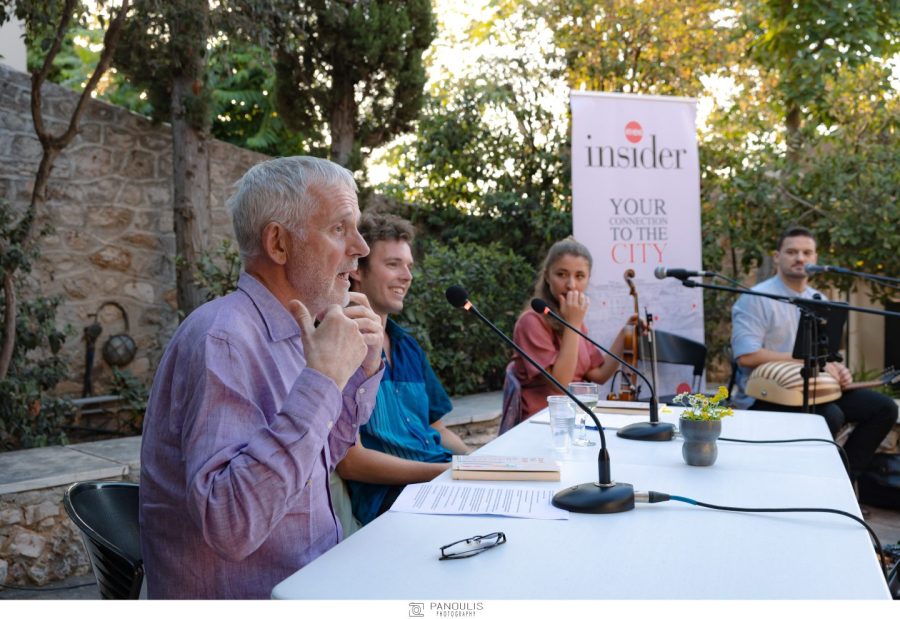
By Maya Abuali
As if summoned by the spirits of the area’s ancient philosophers themselves, the Athenian literati gathered on Tuesday night in Plaka for a literary salon hosted by Athens Insider. The event, which was part of the This Is Athens City Festival, took place on the enchanting terrace of University of Athens’ History Museum as twilight fell over the city.
Among the speakers were the brilliant Sofka Zinovieff, podcaster, journalist, and author; Julian Hoffman, intensely perceptive conservationist and writer; Joshua Barley, a poet and translator whose passion seeps through his works; and Ian Collins, whose modesty fails to eclipse his deep knowledge as a biographer and curator. The audience was treated to a captivating exchange of ideas as these authors paired up to discuss their work.
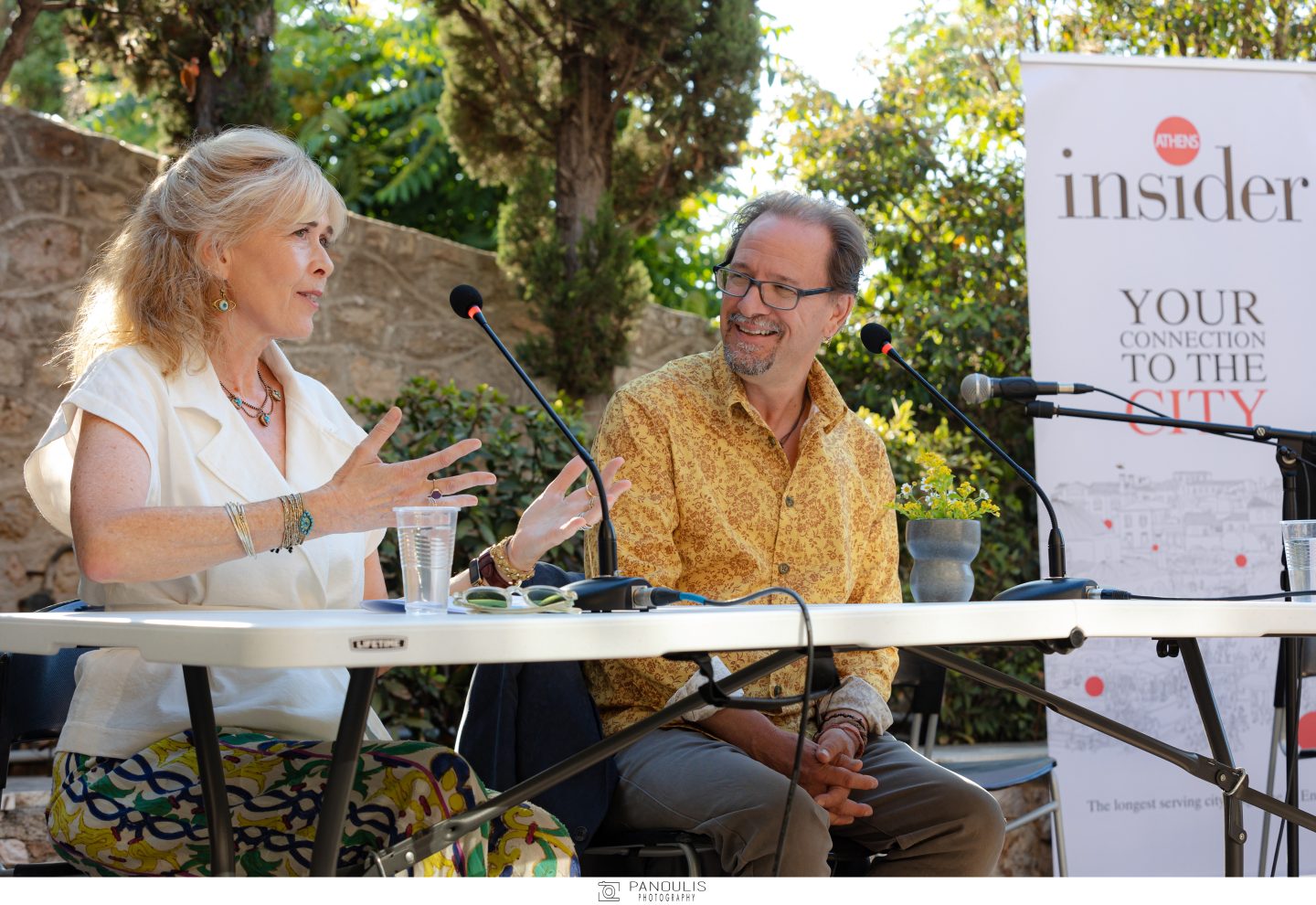
Sofka Zinovieff and Julian Hoffman
Sofka and Julian began the evening, with Sofka inquiring about Julian’s work trying to save threatened places around the world. Sofka’s reflections took the audience on a journey from her initial arrival in Greece as an academic anthropologist to her unique posturist as a memoirist. Her focus has always been on the social and cultural life of the city, but her perspective has been deeply influenced by the environmental changes she’s witnessed over the years. Her famous memoir, Eurydice Street, begins with her return to Greece amidst wildfires that left charred forests on both sides of the road from Patras. Once seen as local tragedies, these fires are now clear indicators of a global catastrophe. Sofka highlighted the interconnectedness of local traditions and heritage with the broader issue of climate change; the things that form the backdrop of her writing are gradually yielding to the relentless pressure of climate change. Together, her and Julian underscored the necessity of balancing beautiful stories of family homes and reborn forests with the looming threats of environmental devastation.
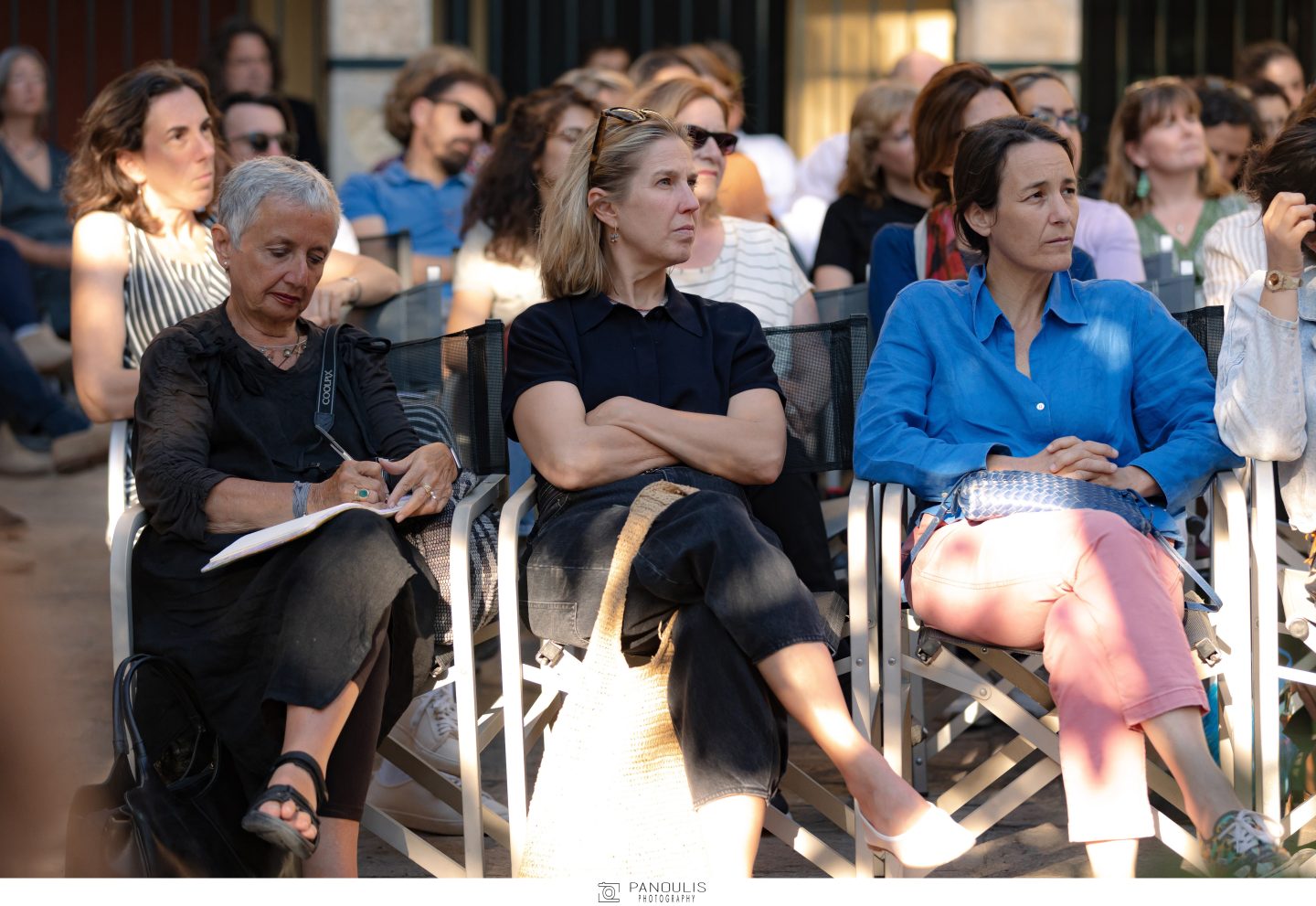
As a dedicated conservationist, the bulk of Julian’s musings were on the natural sphere; Greece’s roaming creatures, chthonic plants, and the ongoing battle to protect them. His upcoming book on his preservation efforts, ‘Irreplaceable,’ charts a journey just as wild: from the jungles of Northeast India to small, community gardens in Glasgow. Beyond the primary ring of immediacy in his voice, there’s a true and rare peripheral sense of care in Julian’s words on our notions of home and belonging. “I argue in this book that it’s imperative for us to expand our idea of homes beyond just the physical structure itself,” Julian explained. “Your home has to be considered a much greater thing because ultimately it’s what anchors us to this world.”
Living by the Prespa lakes at the fringes of three countries, Julian has developed a unifying philosophy. “I live my life around borders, and it occurs to me all the time that our conception of borders largely revolves around a sense that they are points of separation, he said. “But of course, that’s only if you look at it from one angle, because borders are also meeting points.” His affection for the natural world is refreshingly optimistic: “To make radical changes […] doesn’t necessarily require this huge infrastructure around us or a lot of money, it just requires love […] Real hope—or what I call radical hopefulness—which is really about communities and individuals becoming engaged, that word is a true verb because it acts on other people. You change your inner landscape for a start, and that changes your outer landscape as well.”
Before the two concluded, Sofka delighted the audience with a teasing snippet of her upcoming story: ‘Stealing Dad.’ Banned from attending the funeral by their stepmother, the author along with her siblings hatch a plan to reclaim their father’s body after his passing. It’s based on true events, Sofka says, leaving the audience with eager appetites for a story that promises belly laughter, the grounding bite of grief, and poignant reflections on the lengths we go to for those we love.
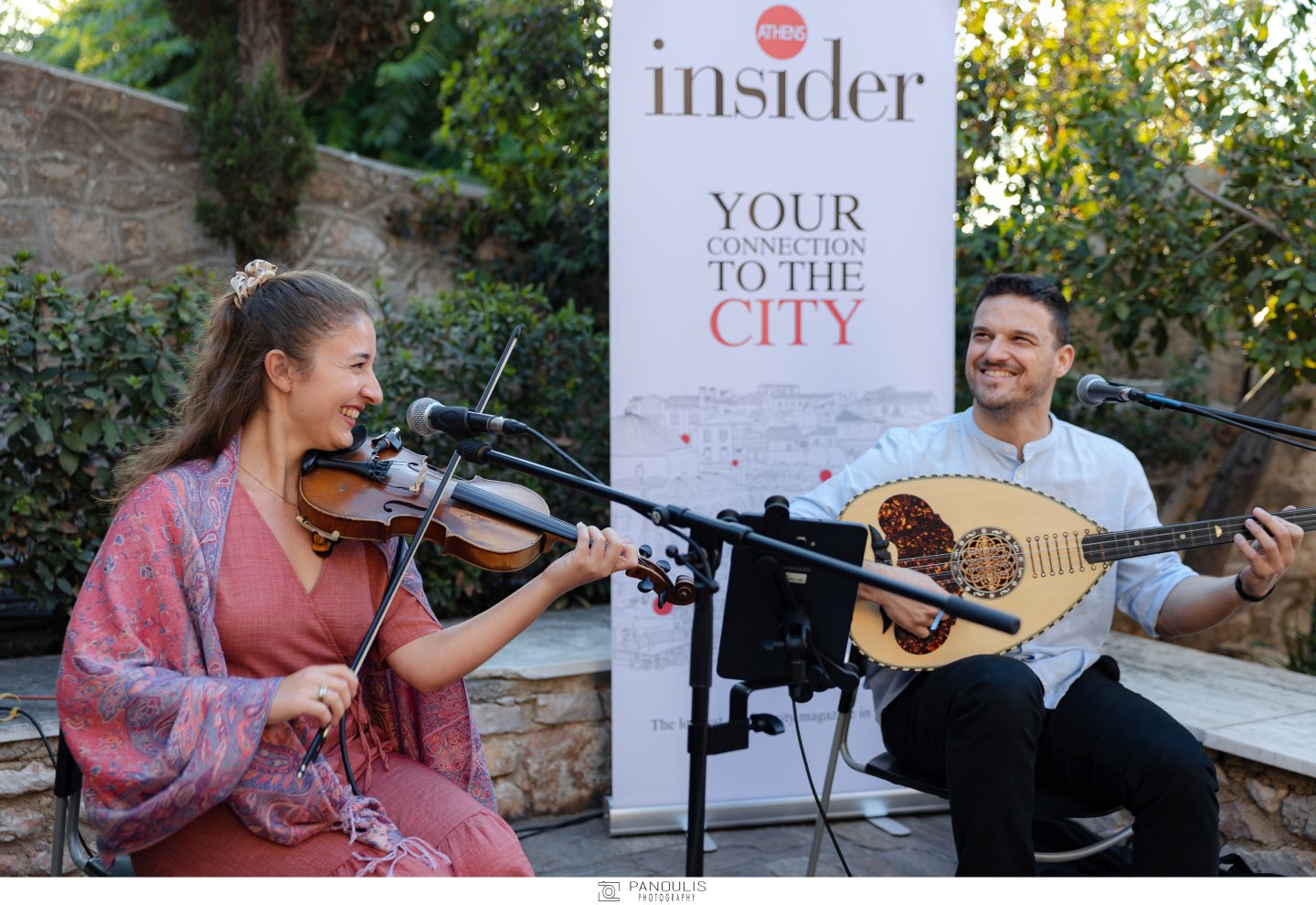
Azygia — Athina Siskaki and Georgos Farantos
After a short break where wine-tasting mingled with conversation, the second half of the evening began, featuring spellbinding live performances by Greek duo Asigia. The lead singer, Athina Sisk, lured passersby like a siren, while George Farantos accompanied her on the bouzouki. The ancient ballads they played gave the swirling murmurations of birds above a reason to dance—and elicited more than a few involuntary gasps from spectators.
Joshua Barley and Ian spoke next. Ian recalled a drink he had had with Joshua, where Joshua described his all-encompassing love for Greece as “passionate idealism” (though Joshua chimed in that he was “probably drunk” when he labeled it so). His love for the country’s culture, history and language rests upon the survival of myth in everyday existence.
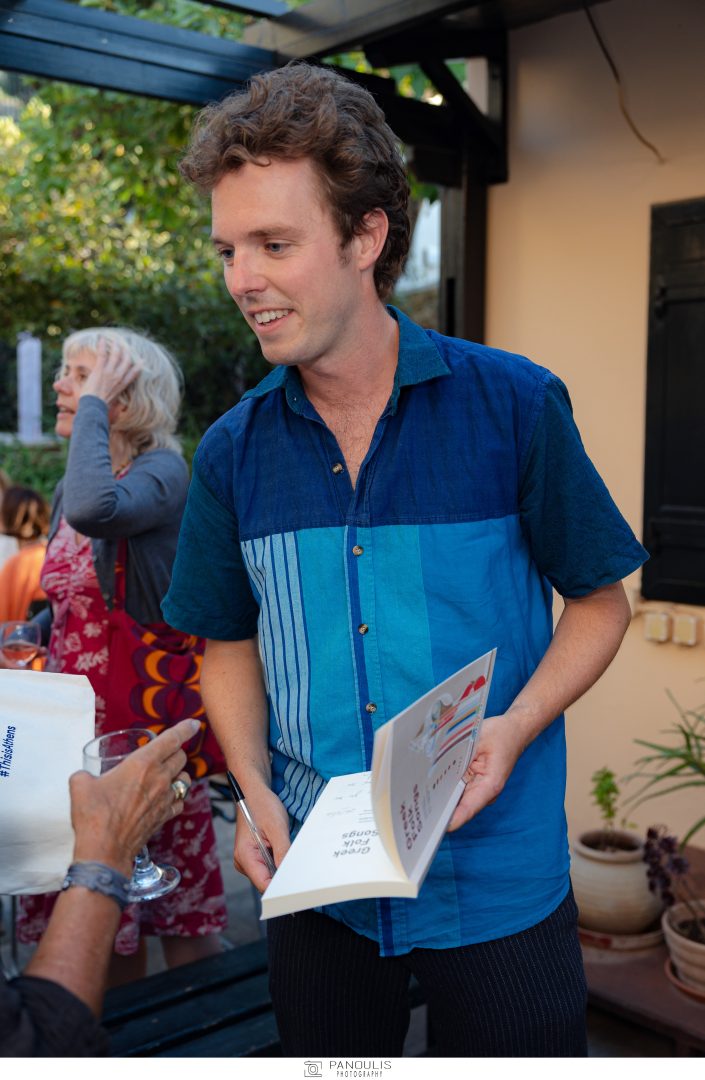
Joshua Barley
“I think there is a great sense of idealism obviously about Greece, “Joshua said. “The whole idea of modern Greece was an idealistic vision, and the early 19th century folk songs have a lot to do with that; this whole idea of revival, of hellas, is an inherently poetic, idealistic notion that founded the modern Greek notion, so I think it’s sort of natural that people have felt the same sense of idealism coming to Greece, it’s so imbued in the country as a place of ideals.”
Trained as a translator through the Academy of Athens’ scholarship program during the financial crisis of 2012, Joshua’s work focuses on preserving and sharing Greek folk songs. His translations draw from the earliest 19th-century collections, capturing the literary and living elements of Greek folk traditions. The songs performed by Athina and Georges highlighted the enduring power and sophistication of this oral tradition. “This was one of the first projects I’ve done purely out of love for the subject matter…” he said, describing his latest translation. “[The songs] have an extraordinary virtuosity about them, and they have a linguistic complexity which you would not necessarily imagine for a folk song tradition.”
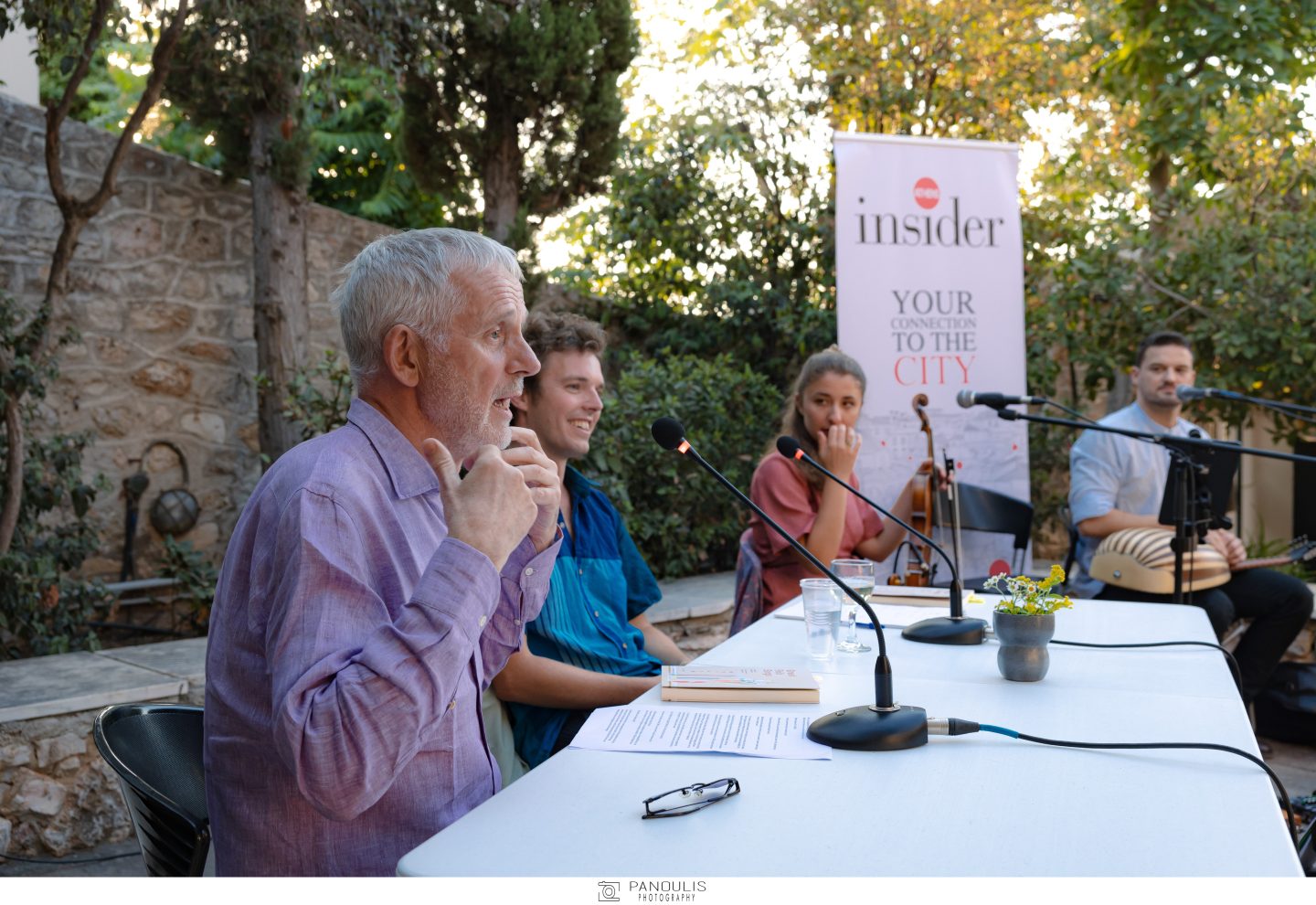
Ian Collins, Joshua Barley, Athina Siskaki, and Georgos Farantos
Ian Collins interjected to include a haunting story about George Seferis’ wife, Maria Zannou. Ian masterfully painted the picture with his words: “We do not weep,” Maria declared, her voice a firm command that halted the sobs of his grieving family that gathered around the open casket. Instead, she performed a solemn gesture, cutting a lock of her own hair and placing it beside the body. In this act, she harkened back to ancient Greek funerary customs, where women, in their anguish, would tear their hair out. Audience members, chatting afterwards over flutes of wine, regarded it as one of the most memorable moments of the evening.
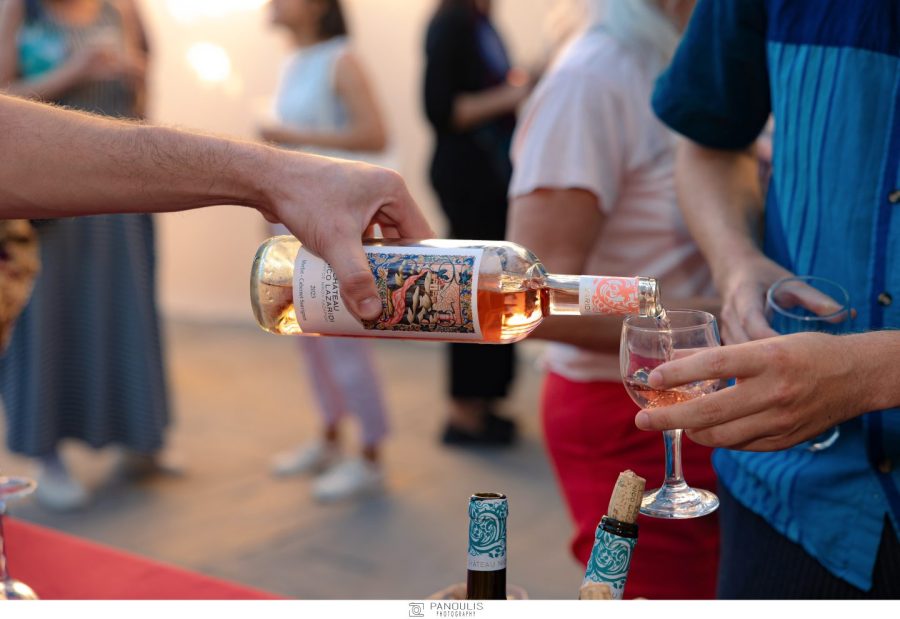 A big thank you the brilliant team at This is Athens, to Nico Lazaridis for delicious wine, Elegant Asymmetry for audio support, Mama Roux Catering for catering support, Aegean Airlines for complimentary flights and The Gem Society Hotel for hosting our writer.
A big thank you the brilliant team at This is Athens, to Nico Lazaridis for delicious wine, Elegant Asymmetry for audio support, Mama Roux Catering for catering support, Aegean Airlines for complimentary flights and The Gem Society Hotel for hosting our writer.
To celebrate Athens’ rich culture and engage in intellectually stimulating conversations with the city’s brightest minds, visit Athens Insider to learn about our upcoming literary salons.


